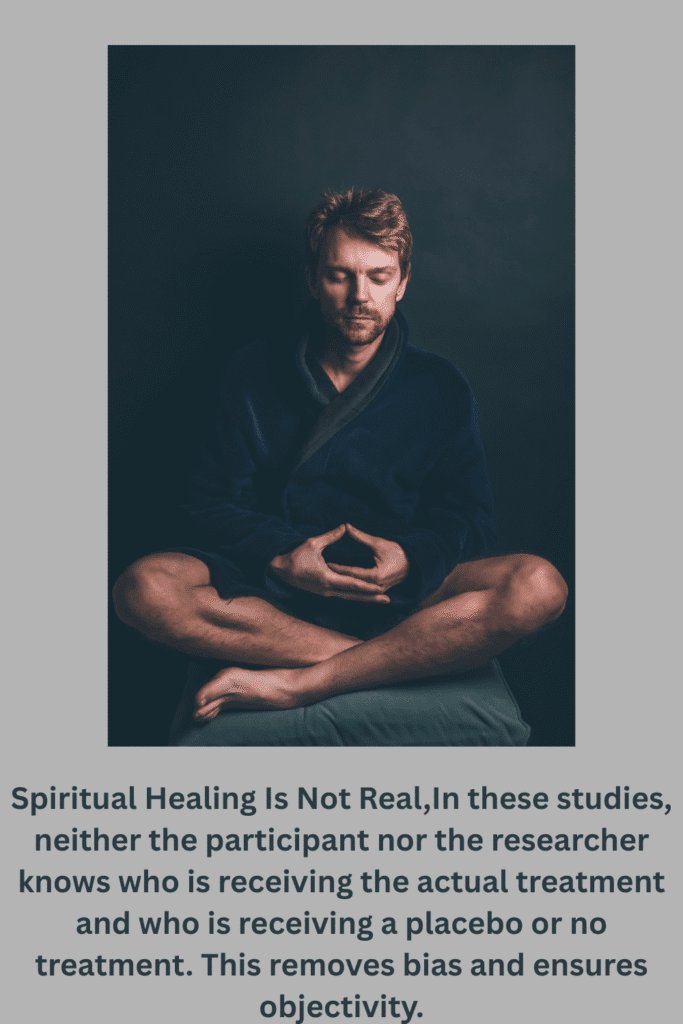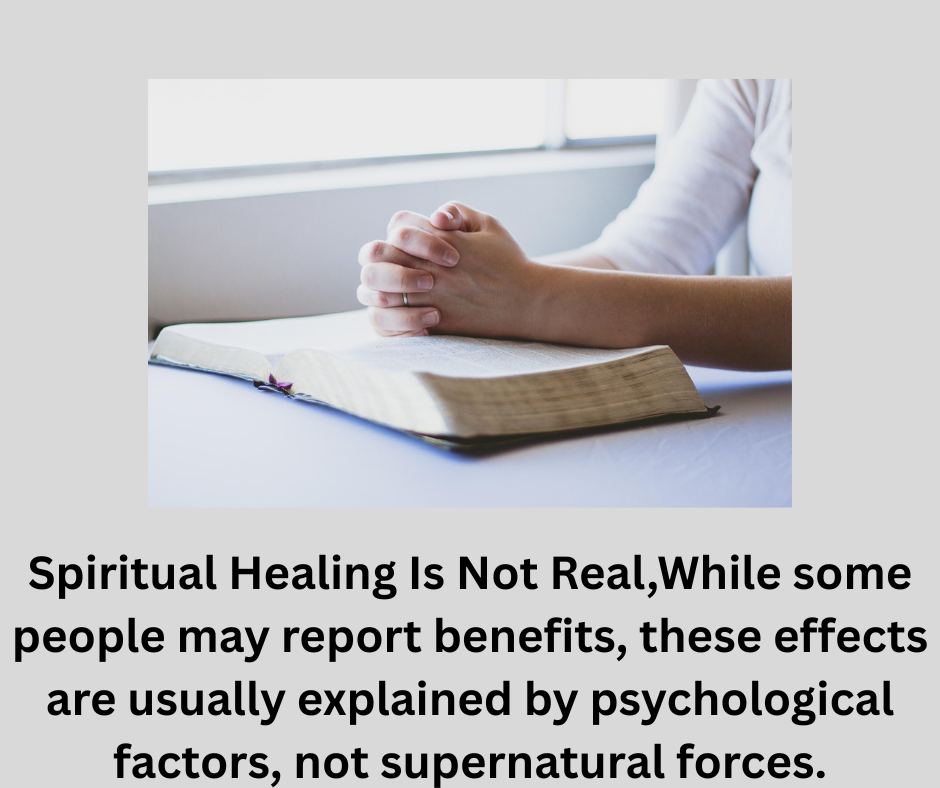A Scientific Look at the Claims and the Controversy
Introduction
Spiritual Healing Is Not Real a practice that claims to restore health and well-being through non-physical means—often involving prayer, energy transfer, or divine intervention. Across the world, millions believe in spiritual healers, reiki masters, or energy medicine practitioners who say they can heal the body and mind using spiritual or supernatural forces.
However, extraordinary claims need strong evidence from a scientific perspective. Empirical evidence, which consists of data gathered through testing, observation, and reproducible experiments, is considered the gold standard in psychology and medicine. When researchers investigate spiritual healing, their results often fail to demonstrate that it is more effective than a placebo.

This article outlines five major empirical findings that cast serious doubt on the validity of spiritual healing.
Table of Contents
Double-Blind Studies Fail to Show Healing Effects
Double-blind, randomized controlled trials (RCTs) are considered the most reliable method of evaluating medical treatments. Spiritual Healing Is Not Real,In these studies, neither the participant nor the researcher knows who is receiving the actual treatment and who is receiving a placebo or no treatment. This removes bias and ensures objectivity.
Harvard Medical School’s Dr. Herbert Benson carried out a thorough study on spiritual healing, which appeared in the American Heart Journal in 2006. The STEP (Study of the Therapeutic Effects of Intercessory Prayer) trial involved nearly 1,800 patients receiving cardiac surgery
Patients were divided into three groups:
- Group 1 received prayers but didn’t know it.
- Group 2 received no prayers and didn’t know it.
- Group 3 received prayers and were told they were being prayed for.
Results:
The recovery rates were comparable for both groups, regardless of whether they received prayers or not. Notably, the participants who were aware they were receiving prayers encountered some additional challenges, potentially due to anxiety or pressure related to their performance.
Conclusion: This large-scale, well-controlled study provided no evidence that intercessory prayer improved healing outcomes.
2. The Placebo Effect Explains Apparent Results
Many people report feeling better after a spiritual healing session. However, improvements in symptoms are often due to the placebo effect, not the healing itself. Spiritual Healing Is Not Real,The placebo effect is a powerful psychological phenomenon in which a person’s belief in a treatment causes them to feel better—even if the treatment has no active ingredients or physical effect.
A 2011 review published in the journal Pain analyzed multiple studies on energy healing methods such as reiki and therapeutic touch. The researchers concluded that any reported benefits were consistent with placebo responses—not real therapeutic effects caused by energy manipulation or spiritual forces.
Key placebo-related factors include:
- Belief and expectation: Patients who believe they will get better are more likely to feel better.
- Attention and care: Simply being listened to and touched in a soothing way has healing effects.
- Natural recovery: Many conditions improve on their own, making it seem like the healing worked.
Thus, while patients may feel better after spiritual healing, this does not prove the treatment caused the improvement.
3. No Mechanism for “Healing Energy” Has Been Detected
Many spiritual healing systems—like reiki, chakra therapy, or pranic healing—are based on the idea that there is a universal or spiritual “energy” that flows through the body. Spiritual Healing Is Not Real,Blockages in this energy supposedly cause illness, and spiritual healers claim they can clear these blockages.
However, this energy has never been measured or detected by scientific instruments.
- No electromagnetic fields or forces corresponding to this “life energy” have been identified.
- Attempts to measure auras, biofields, or healing energies have failed under controlled conditions.
- The concept of “healing energy” remains entirely metaphysical—outside the realm of observable science.
One notable experiment was conducted by Emily Rosa, a 9-year-old girl, published in the Journal of the American Medical Association in 1998. She tested practitioners of therapeutic touch, who claimed they could feel energy fields around people.

Emily asked them to identify which of her hands (left or right) was near their field while their view was blocked. The healers were correct only 44% of the time—worse than random chance.
Conclusion: Claims about healing energy remain unsupported by measurable, objective evidence.
4. Meta-Analyses Show No Significant Health Benefits
Meta-analysis is a method that combines results from multiple studies to assess overall trends. Spiritual Healing Is Not Real,When researchers have conducted meta-analyses on spiritual healing and intercessory prayer, the conclusions are consistently skeptical.
- A well-known case is the meta-study that came out in Perfusion in 2006 by the famous expert in alternative medicine, Dr. Edzard Ernst. After looking at 23 different studies about spiritual healing, he found that:
- Most were of poor quality, with small sample sizes and high bias risk.
- High-quality studies consistently showed no clinical benefit.
- The more rigorous the study, the less likely it was to show any effect.
Conclusion: When subjected to large-scale analysis, spiritual healing fails to produce consistent, statistically significant results.
5. Healing Claims Are Not Reproducible Under Controlled Conditions
Reproducibility is a cornerstone of the scientific method. If a treatment works, Spiritual Healing Is Not Real,it should work again and again under the same conditions. However, spiritual healing fails this test.
When tested under laboratory conditions:
- Claims of miracle cures or energy healing disappear.
- Healing outcomes vary wildly between practitioners.
- Studies often show no repeatable benefit, even when the same healer performs the treatment.
James Randi, a well-known skeptic and magician, offered a $1 million prize to anyone who could demonstrate paranormal healing or psychic abilities under controlled conditions. Despite hundreds of applicants over the years, no one ever passed the tests.
This inability to reproduce spiritual healing results in scientific settings strongly suggests that such claims are not based on real, measurable phenomena.
So Why Do People Still Believe?
- Though there is no scientific proof, millions still have faith in spiritual healing. This can be related to various psychological and cultural influences:
- Personal anecdotes and emotional testimonials are powerful, even if not scientifically valid.
- People often turn to spiritual healing out of desperation, especially when conventional medicine fails.
- Cultural and religious beliefs may encourage spiritual interpretations of illness and healing.
- The placebo effect and natural recovery are mistaken for miracles.
While belief in spiritual healing may bring comfort, it’s important to understand the difference between subjective experience and objective evidence.
Conclusion:
From the perspective of modern science and medicine, the evidence is clear spiritual healing has not been proven to work under controlled, repeatable conditions. Spiritual Healing Is Not Real,While some people may report benefits, these effects are usually explained by psychological factors, not supernatural forces.
The five key empirical findings that challenge the reality of spiritual healing are:
- Double-blind studies show no significant improvement in health outcomes.
- Placebo effects explain most of the perceived benefits.
- No measurable energy or mechanism has been detected.
- Meta-analyses reveal inconsistent or no clinical benefit.
- Healing claims are not reproducible in scientific experiments.
This doesn’t mean that spiritual practices have no value—many people find peace, hope, and emotional healing through prayer, meditation, or community rituals. But when it comes to curing physical illness, empirical science reminds us to rely on treatments that are proven, testable, and safe.
In summary, belief in spiritual healing is a personal choice, but it should not be mistaken for evidence-based medicine.